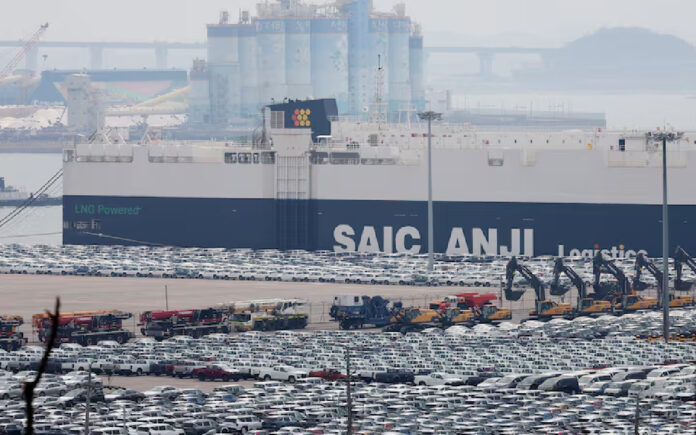Seoul: South Korea has announced a comprehensive set of emergency measures to support its auto industry in response to U.S. President Donald Trump’s decision to impose a 25% tariff on imported cars and light trucks, a move set to take effect on Thursday.
The package includes increased financial assistance, tax relief, and expanded subsidies aimed at bolstering domestic demand. In addition, the South Korean government pledged to intensify diplomatic efforts to negotiate with the U.S. while actively seeking to diversify its export markets.
“Given the (lower) proportion of South Korean automakers’ local production in the United States, our industry is comparably at a disadvantage,” the government stated. Officials warned the tariffs are likely to inflict “significant” damage on domestic automakers and auto parts manufacturers, though quantifying the impact remains difficult at this stage.
To alleviate potential liquidity issues, the government will boost policy financing support for the sector to 15 trillion won ($10.18 billion) in 2025, up from a previously planned 13 trillion won. In addition, automobile purchase taxes will be temporarily reduced from 5% to 3.5% until June 2025.
Electric vehicle subsidies will be expanded to cover 30% to 80% of price discounts, a substantial increase from the current 20% to 40%, with the subsidy program extended by six months through the end of this year.
Officials also outlined plans to assist automakers in targeting new export markets, especially in the Global South—emerging economies across Africa, Latin America, and Asia—where demand for vehicles continues to grow.
On the issue of tariffs, the government stated: “We will do our best to ensure that the U.S. does not treat South Korea in a disadvantageous way compared with other allies, through negotiations and by strengthening bilateral cooperation,” though no specific details were disclosed.
Industry representatives cautiously welcomed the government’s support plan. “There is a lot of concern in the auto industry about whether this alone will be enough,” one industry official told Reuters on condition of anonymity.
Also Read | Hezbollah Signals Willingness to Discuss Disarmament if Israel Pulls Back
In 2024, South Korea exported $34.7 billion worth of automobiles to the United States, which represented 49% of its total auto exports.
Hyundai Motor, the country’s leading carmaker, said it will keep sticker prices unchanged for the next two months to reassure customers in light of the tariff announcement. The move comes shortly after Hyundai’s $21 billion investment pledge in the U.S.
Also Read | New Trump Orders Clash with Climate Goals in Coal Boost Drive
Hyundai Motor’s co-CEO Jose Munoz said there were no immediate plans to raise prices in the U.S., which remains the company’s most important market in terms of revenue.
Analysts believe the tariffs may be part of a broader negotiating tactic by President Trump. They also warn of higher production costs across the board, especially in the electric vehicle sector, which remains heavily dependent on Chinese components.



